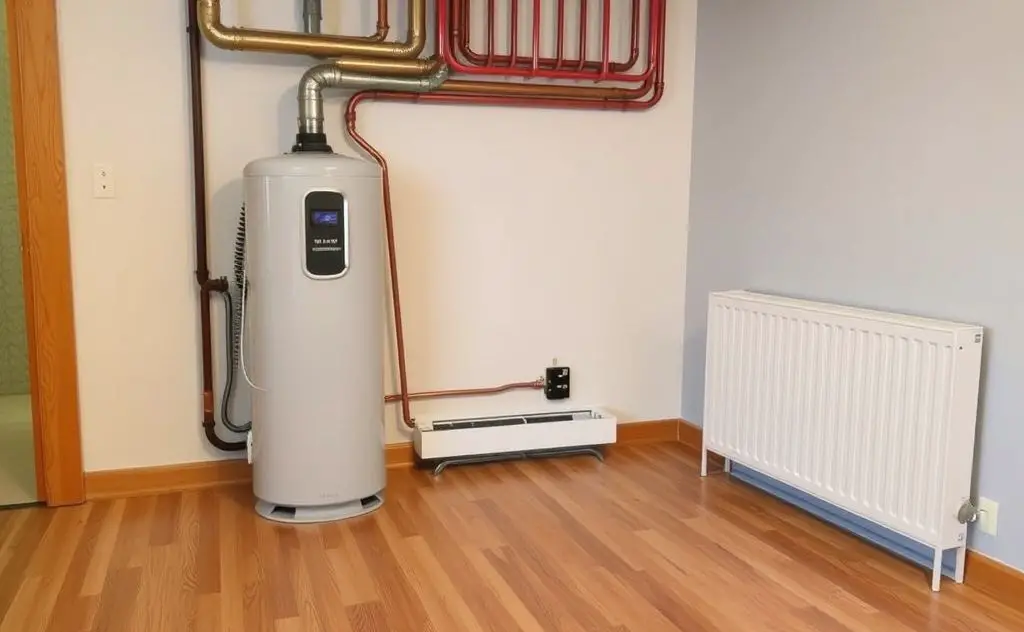Electric baseboard heaters offer easy installation and precise temperature control, while natural gas heaters provide faster heating and lower operating costs, making the choice dependent on your home’s infrastructure and energy preferences.
Choosing between electric baseboard heaters and natural gas heating systems is a critical decision for homeowners. Both options have distinct advantages and drawbacks in terms of cost, efficiency, and performance. This comprehensive comparison will help you determine which system best fits your needs.

How Electric Baseboard Heaters Work
Electric baseboard heaters operate through simple resistance heating. Cold air enters the unit through vents at the bottom, gets heated by electric coils, and rises back into the room through convection currents. These systems are typically installed along exterior walls beneath windows.
Types of Electric Baseboard Heaters
There are two primary types:
- Convection models: Use natural air movement
- Fan-assisted models: Include small fans for faster heat distribution
For optimal performance, consider pairing your system with the best thermostat for baseboard heaters to improve temperature control.

How Natural Gas Heating Systems Work
Natural gas systems burn fuel to create heat that gets distributed either through forced air ducts or hydronic (water-based) systems. The combustion process occurs in a furnace or boiler, with heat then circulated throughout the home.
Types of Natural Gas Heaters
- Forced air furnaces: Most common in modern homes
- Hydronic baseboard systems: Use heated water through pipes
- Wall-mounted units: Like ventless natural gas wall heaters
Cost Comparison
| Factor | Electric Baseboard | Natural Gas |
|---|---|---|
| Installation Cost | $50-$200 per unit | $3,000-$7,000+ for whole home |
| Operating Cost | Higher (electricity rates) | Lower (natural gas prices) |
| Maintenance | Minimal | Annual servicing recommended |
According to U.S. Department of Energy, natural gas typically costs less than electric resistance heating in most regions.
Efficiency and Performance
Electric Baseboard Efficiency
While 100% efficient at converting electricity to heat, electric baseboards struggle in very cold climates. They work best as supplemental heating or in mild winter areas.
Natural Gas Efficiency
Modern gas systems achieve 90-98% efficiency. High-efficiency condensing models capture additional heat from exhaust gases. Gas systems provide more consistent whole-home heating.
Safety Considerations
Electric Baseboard Safety
- No combustion or carbon monoxide risk
- Surface temperatures can reach 150-200°F
- Require clearance from flammable materials
Natural Gas Safety
- Require proper venting to prevent CO buildup
- Need annual inspections for leaks
- Modern units have multiple safety shutoffs
For those concerned about gas safety, read our guide on are ventless gas heaters safe.
Comfort and Air Quality
Electric baseboards can create dry air and uneven heating. Natural gas systems generally provide more consistent temperatures and better humidity levels. However, gas forced air systems can circulate dust if filters aren’t maintained.
Environmental Impact
Natural gas burns cleaner than other fossil fuels but still produces emissions. Electric heating’s environmental impact depends on your local power grid’s energy sources. According to EIA data, natural gas emits about half the CO2 of coal when burned.
Installation Requirements
Electric Baseboard Installation
Relatively simple, often DIY-friendly. Requires adequate electrical circuits and proper placement along exterior walls. Follow our installation guide for baseboard heaters for best results.
Natural Gas Installation
Professional installation mandatory. Requires gas line access, proper venting, and often ductwork. More complex for retrofit situations.
Long-Term Considerations
Electric baseboards have a lifespan of 15-25 years with minimal maintenance. Natural gas systems typically last 15-20 years but require more regular servicing. Both systems can be affected by local utility price fluctuations.
Best Applications
When to Choose Electric Baseboard
- Small spaces or supplemental heating
- Homes without gas service
- Budget-conscious installations
- Mild climate areas
When to Choose Natural Gas
- Whole-home heating
- Colder climates
- Homes with existing gas service
- Long-term cost savings
